
Introduction: Can You Work in Salesforce and Excel at the Same Time?
For many businesses using Salesforce, managing large amounts of data, updating records, and creating reports are essential tasks. However, not everyone finds Salesforce’s tools user-friendly. Excel is a favorite for business professionals because it makes organizing and analyzing data easy with features like pivot tables, formulas, and charts. When you combine Excel with Salesforce, managing your CRM data becomes even more efficient.
- The Challenge: How Do You Connect Salesforce and Excel?
- What Is XL-Connector from Xappex?
- How to Install XL-Connector: Step-by-Step Guide
- Key Features of XL-Connector
- Key Features for Salesforce Admins and Developers
- 1. Manage Salesforce Scoping and Restriction Rules
- 2. Bulk Upload Multiple Related Records
- 3. Dynamic UI Adjustments via Customer Portal
- 4. Mass Managing Salesforce Fields and Field-Level Security
- 5. Automating Data Loads with XL-Connector Flows
- 6. Converting Leads in Bulk
- 7. Loading Custom Metadata
- 8. Using Custom Formulas to Dynamically Pull Data
- 9. Validating Dependent Picklists
- 10. Uploading Files to Salesforce
- 11. VBA and Advanced Automation
- 12. Analyzing Field Utilization Across Layouts
- 13. Generating Visualforce Pages from Page Layouts
- 14. Removing Duplicate Records
- 15. Bringing Picklist Values into Reports
- Use Cases and Business Benefits of XL-Connector
- 1. Improving Efficiency in Bulk Data Updates
- 2. Automating Daily Reports and Data Syncs
- 3. Managing Field-Level Security Across Departments
- 4. Facilitating Smooth Data Migration
- 5. Simplifying Custom Metadata and Scoping Rules Management
- 6. Bulk Lead Conversions for Sales Teams
- 7. Simplified File Uploads
- 8. Automating Custom Reports with Excel Formulas
- User Experience: Interface and Ease of Use
- User Feedback: What People Are Saying About XL-Connector
- Pricing and Licensing Options
- Wrapping Up
The Challenge: How Do You Connect Salesforce and Excel?
While Salesforce is great at handling customer data, its interface can be overwhelming for people who are more comfortable with Excel. The good news is that you can work in Salesforce and Excel at the same time. XL-Connector is the tool that makes this possible. It acts as a bridge, letting you pull data from Salesforce into Excel, work with it, and then sync your changes back to Salesforce, all without having to switch between the two platforms constantly.
With XL-Connector, you can:
- Pull Salesforce data into Excel, make changes, and push updates back in just a few clicks.
- Work offline on your Excel spreadsheet, then sync with Salesforce when you’re back online.
- Easily handle tasks like mass data updates, report generation, and data migration from within Excel.
- And more!
This integration simplifies the process and saves time, especially for those who are more comfortable using Excel. If you’re comparing different tools, you can explore this comparison of popular Excel to Salesforce connectors to see how XL-Connector stacks up against others.
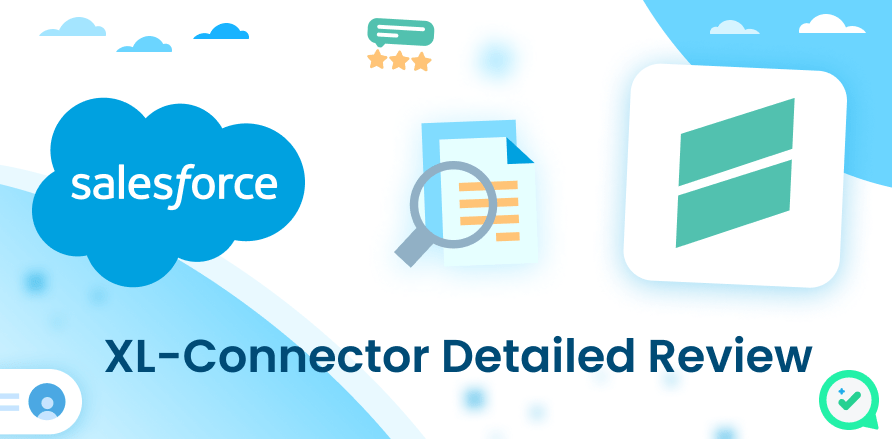
If you’re looking for a tool that works on any version of Excel, check out XL-Connector 365. It’s the web-based version of XL-Connector, designed for easy data and workflow automation, along with real-time reporting. This means you can quickly pull, update, and sync Salesforce data directly in Excel, all while saving time on repetitive tasks.
For a detailed breakdown of its features and benefits, take a look at this Excel Connector Salesforce. If you’re exploring different options, you can also learn more about other Excel to Salesforce integrations and Data Loading Tools in Salesforce to see what works best for your needs.
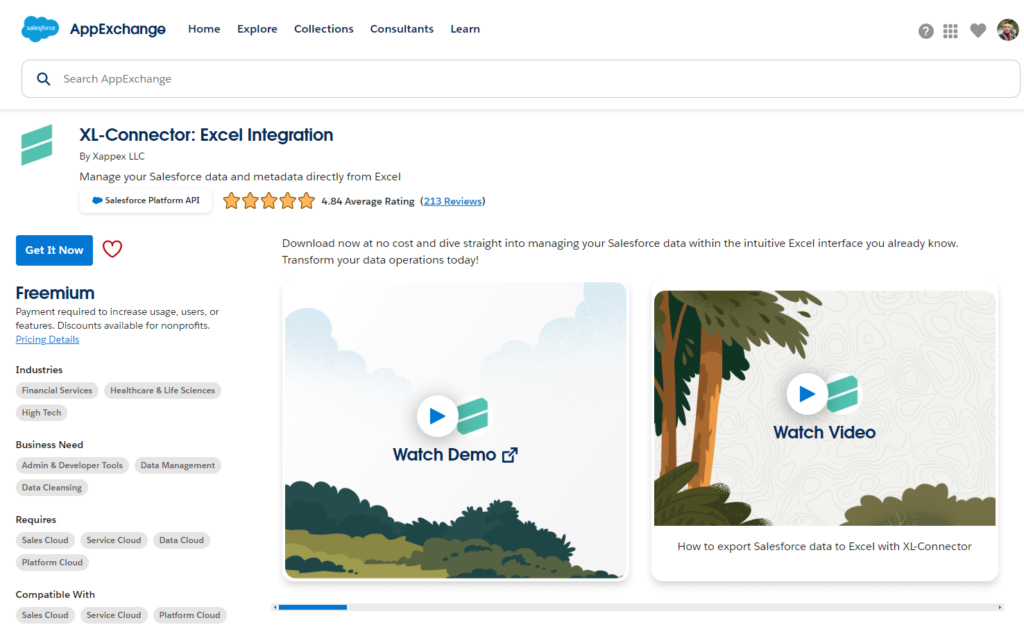
Get your XL Connector from the Salesforce AppExchange.
What Is XL-Connector from Xappex?
XL-Connector is an Excel-based tool that integrates Salesforce data directly into Microsoft Excel, making it easier to manage, update, and analyze your Salesforce records from within a familiar environment. This tool caters specifically to users who prefer working in Excel, allowing them to seamlessly pull data from Salesforce, manipulate it, and push updates back into Salesforce with just a few clicks.
For many businesses, data operations like bulk updates, data migration, and report generation are frequent and necessary tasks. Doing these operations directly in Salesforce can sometimes be slow or cumbersome, especially when managing datasets. By using XL-Connector, Salesforce administrators and business users can perform all these tasks faster within Excel, leveraging Excel’s rich set of features for data manipulation, such as formulas, pivot tables, and filters.
Key Use Cases
XL-Connector is particularly useful for businesses that need to handle bulk data operations. It allows users to:
- Import and export large volumes of data.
- Perform bulk updates, deletes, or inserts of Salesforce records (such as leads, accounts, or opportunities).
- Manage Salesforce metadata, like field-level security, validation rules, and picklists, directly from Excel.
For example, if you are handling a large number of Salesforce leads that need to be updated or converted, XL-Connector lets you perform these updates in bulk. Instead of updating each record manually in Salesforce, you can load the data into Excel, make your updates quickly, and then push the changes back into Salesforce. This can save hours of time and reduce the chances of human error during the data entry process.
XL-Connector vs. XL-Connector 365: What’s the Key Difference?
XL-Connector 365 is the web-based version of XL-Connector, designed to easily link Salesforce with Excel and Excel Online. It simplifies data management by letting users handle even the most complex data tasks without needing to switch between platforms. Whether you need to export data from Salesforce, update records, or perform detailed data analysis, XL-Connector 365 allows you to do it all directly in Excel.
The tool is packed with useful features like data automation, real-time reporting, and seamless workflow integration, which means you can save time on repetitive tasks and focus on more important work. It’s ideal for businesses that need a flexible and easy way to manage their Salesforce data from the familiar Excel environment.
How XL-Connector Works
Once installed, XL-Connector operates as an Excel add-in. After logging in with your Salesforce credentials, you can pull data from Salesforce using export an existing report or build your own data export using point-and-click tools. You can then work on this data within Excel, using all of Excel’s built-in features to filter, sort, and modify the information. When you’re ready, you can sync your updates back to Salesforce, ensuring all changes are reflected in your Salesforce records.
XL-Connector stands out because of its deep integration with Excel, making it ideal for businesses heavily reliant on spreadsheets for data analysis and reporting. Other tools like Dataloader.io and Data Import Wizard also offer data management solutions, but XL-Connector provides a unique advantage for those who prefer working offline or need more advanced Excel functionalities. It’s especially suited for users who require bulk data operations that can be processed faster and more intuitively in Excel.
How to Install XL-Connector: Step-by-Step Guide
Installing the XL-Connector is straightforward and doesn’t require much technical expertise. This section will guide you through the process of downloading and installing the Excel add-in so you can start managing your Salesforce data from Excel efficiently.
Step 1: Prepare for Installation
Before you begin, it’s recommended that you close Microsoft Excel to ensure a smooth installation. If Excel is running during the installation, you’ll need to restart it once the process is complete.
Step 2: Download XL-Connector
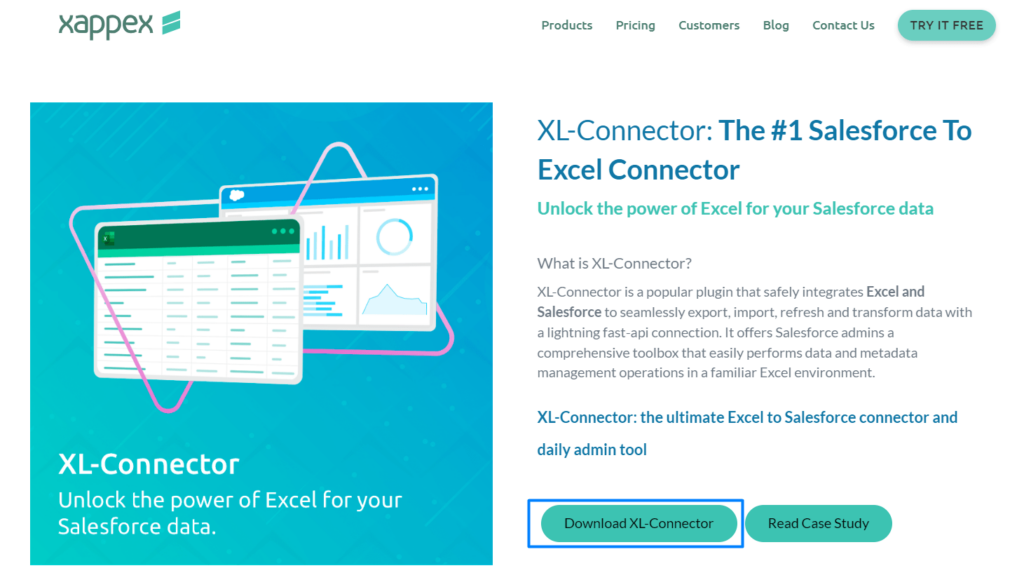
To install the XL-Connector add-in, you’ll first need to download the installation package:
- Visit the XL-Connector download page.
- Click the link to download the installer.
Step 3: Run the Installer
After downloading the file, follow these steps:
- Locate the installer file (XL-Connector-Installer.exe) in your downloads folder.
- Double-click the file to start the installation process.
- Follow the on-screen instructions to complete the installation wizard.
During installation, the system might prompt you to install some necessary Microsoft components, such as:
- Visual Studio Tools for Office Runtime
- .Net Framework 4.5
If these components are required, they will be installed automatically. Be aware that installing the .Net Framework might take some time and may require a system reboot, especially if you’re using an older version of Windows (e.g., Windows XP). If prompted to reboot, make sure you save any work before proceeding.
Step 4: Complete Installation and Restart Excel
Once the installation is finished, restart Excel if it was open during the process. You should now see a new ribbon tab labeled “XL-Connector” in Excel’s menu bar.
Step 5: Log in to Salesforce
When you launch XL-Connector for the first time, you will need to log in using your Salesforce credentials. Once you log in, a 15-day free trial will automatically begin, giving you full access to XL-Connector’s features.
Optional: Using Templates
If you’re interested in dynamically populating Excel sheets with Salesforce data at the record level, XL-Connector offers downloadable templates (in .xlsx or .xlsm formats). This feature allows you to import data directly into specific templates from Salesforce records without needing to manually set up fields
Key Features of XL-Connector
1. Seamless Data Import and Export from Salesforce to Excel
For those who rely on Salesforce reports, XL-Connector also allows you to import data directly from Salesforce reports into Excel. You can refresh these reports in real-time, ensuring you’re always working with the most up-to-date information.
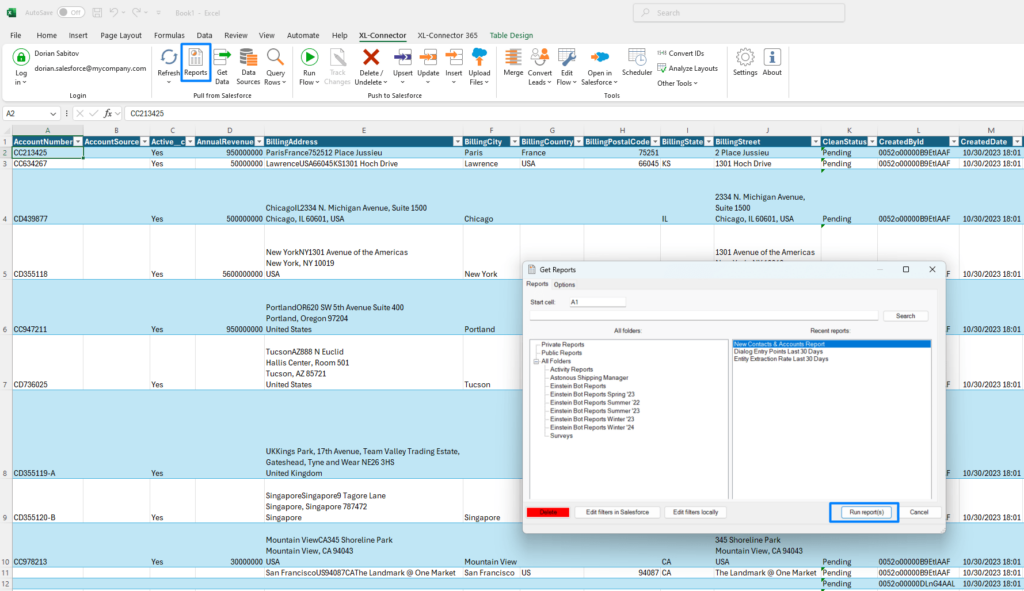
XL-Connector makes importing data from Salesforce to Excel incredibly easy through SOQL (Salesforce Object Query Language). Users can pull any data from Salesforce by simply running queries in the Excel interface, even if they aren’t familiar with coding. The tool offers a query builder that allows for filtering and customizing data imports, giving you the power to bring in exactly the data you need for analysis. This is useful for both experienced users and beginners
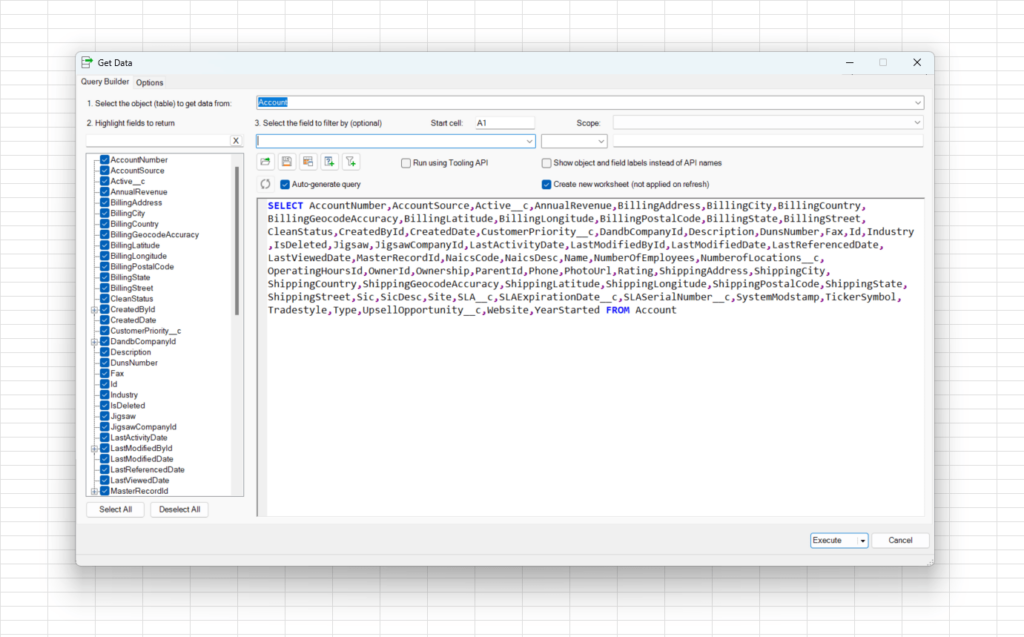
2. Bulk Data Operations (Insert, Update, Delete)
XL-Connector excels at handling large-scale data operations. It allows users to:
- Mass Create: Insert multiple records into Salesforce directly from Excel.
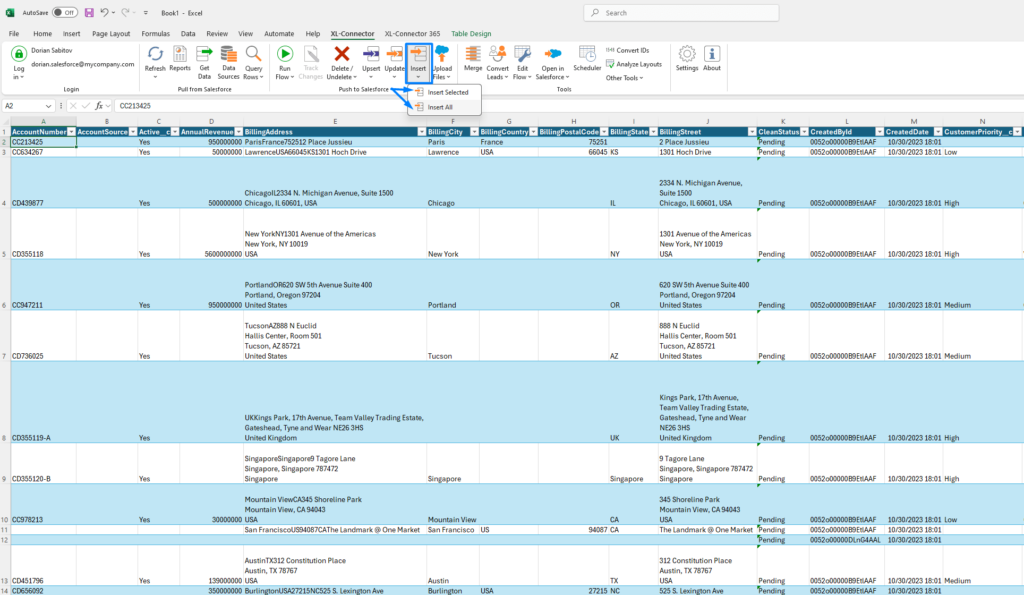
- Mass Update: Modify existing Salesforce records in bulk, which is especially useful for keeping large datasets current without manual data entry.
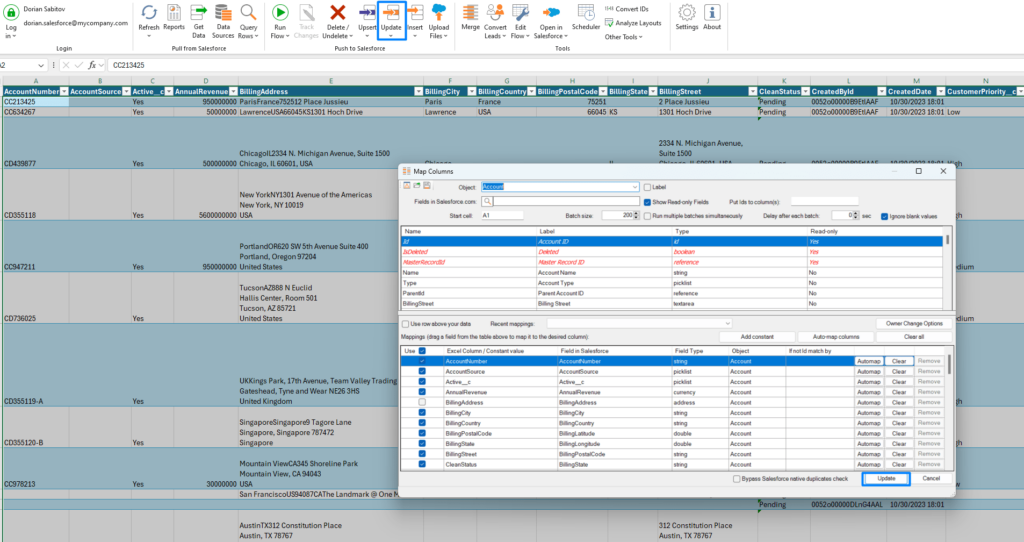
- Mass Delete: Easily remove large sets of records that are no longer needed

For example, if you need to update thousands of Salesforce records, XL-Connector makes it simple to push all changes back into Salesforce with a few clicks, eliminating the need for repetitive manual work.
3. Data Upsert
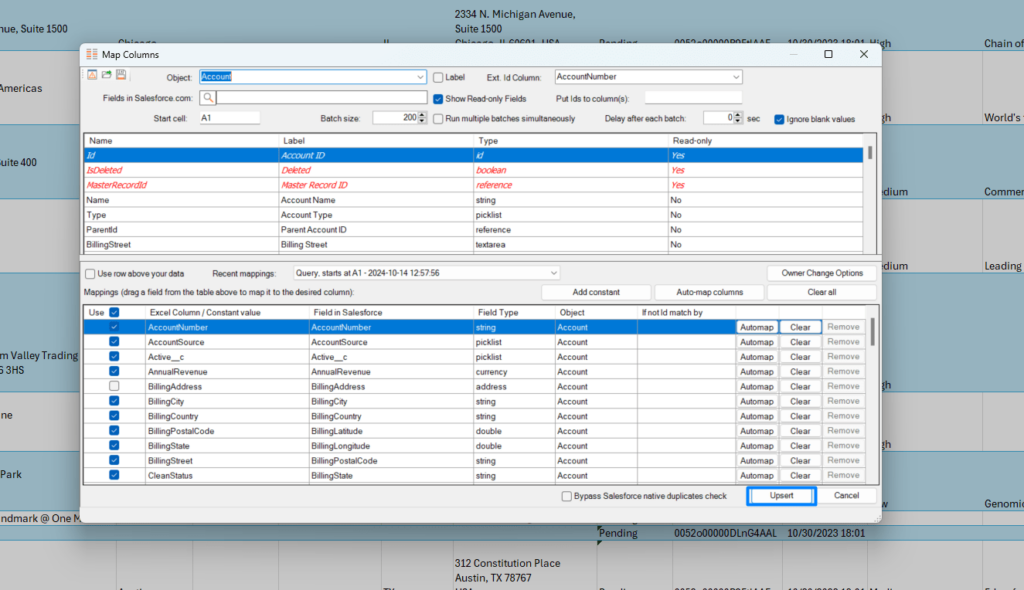
The upsert function is a standout feature, allowing you to create or update Salesforce records in one step. This is particularly helpful when you’re not sure whether a record already exists in Salesforce. Instead of running separate insert and update operations, XL-Connector will either add new records or update existing ones, depending on whether the record is found.
4. Using Excel Formulas with Salesforce Data
XL-Connector allows users to apply familiar Excel formulas to Salesforce data. Whether it’s calculating totals, creating pivot tables, or applying filters, users can manipulate their Salesforce data within Excel just as they would with any other dataset. You can even run SOQL queries using in-cell formulas, which brings dynamic data interaction to the Excel sheet.
5. Offline Work Capability
One of the most practical features of XL-Connector is its ability to work offline. You can download your Salesforce data, work on it while disconnected from the internet, and then sync it back to Salesforce once you’re online again. This is a huge advantage for teams that need to continue working in environments without reliable internet connectivity.
6. Mass Download and Upload of Attachments and Files
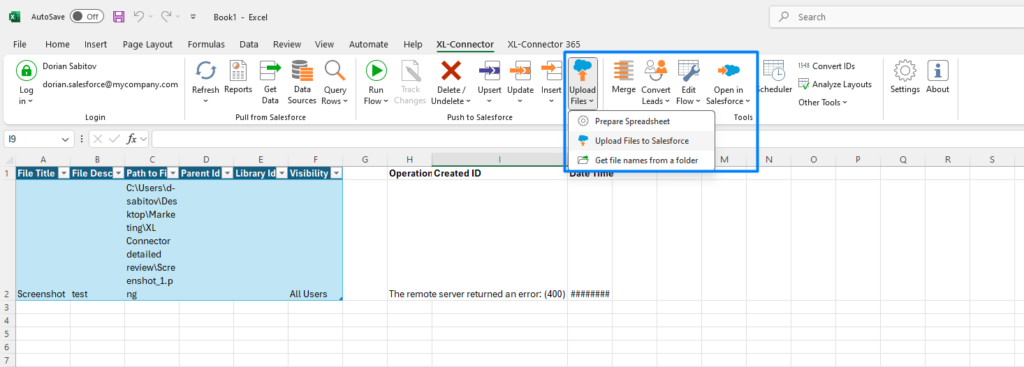
XL-Connector simplifies handling Salesforce attachments. You can bulk-download documents and attachments from Salesforce records, and mass-upload them as well. This is useful for companies that deal with a large number of files, such as invoices or customer agreements and need to manage these files efficiently within Salesforce.
Key Features for Salesforce Admins and Developers
1. Manage Salesforce Scoping and Restriction Rules
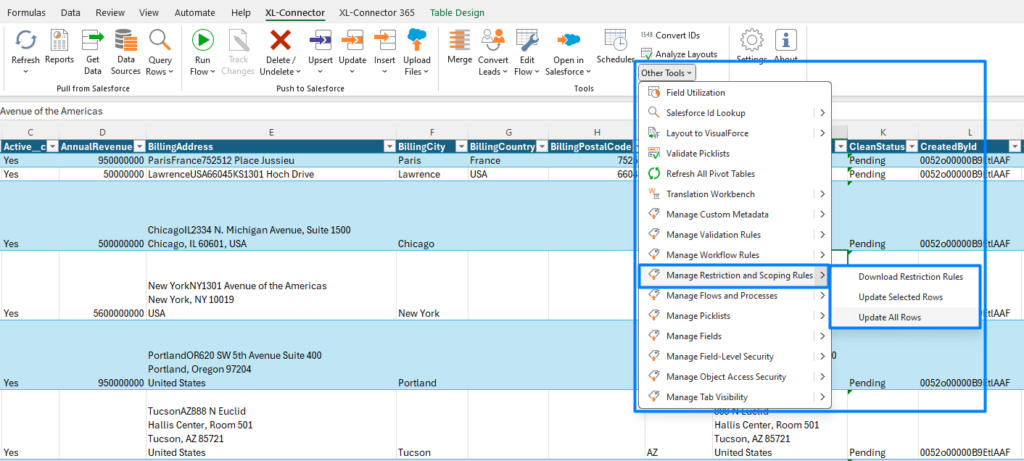
XL-Connector allows administrators to manage Scoping Rules and Restriction Rules directly from Excel. Scoping rules enable you to define which records are visible to users based on specific criteria, such as user roles or record attributes. Restriction rules provide an additional layer of data security by further limiting record visibility with more granular filters. Managing these rules in Excel simplifies the process of configuring data access across your organization, ensuring users see only the data relevant to them.
2. Bulk Upload Multiple Related Records
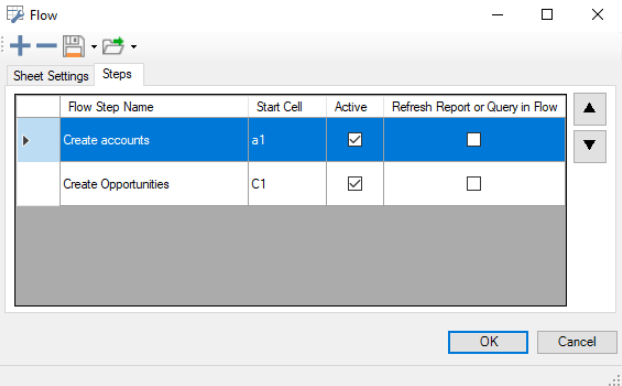
With XL-Connector, you can upload multiple related records in one operation while maintaining their relationships. For instance, you can create Accounts, Contacts, and Opportunities simultaneously, and the tool will handle the relationships between them, such as lookup or master-detail fields. This feature saves time and reduces errors compared to manually entering related records one by one in Salesforce.
3. Dynamic UI Adjustments via Customer Portal
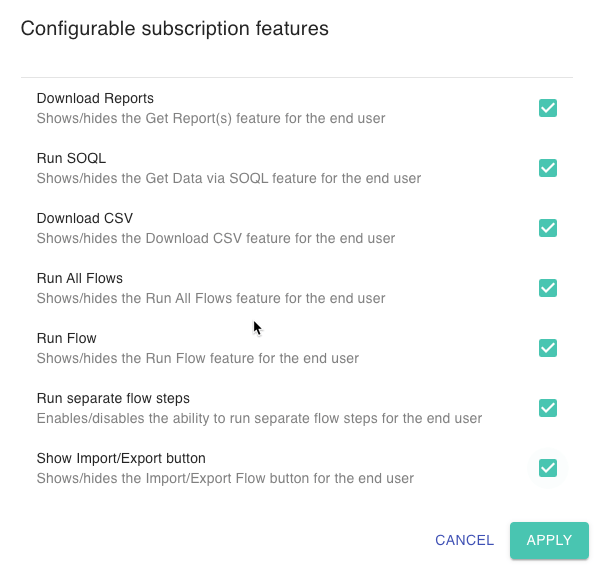
The Customer Portal feature allows admins to customize the XL-Connector interface for different users or teams. You can adjust UI elements based on user roles or preferences, providing a tailored experience that enhances productivity. This is particularly useful when different departments have unique workflows or require access to specific functionalities within the XL-Connector.
4. Mass Managing Salesforce Fields and Field-Level Security
XL-Connector simplifies the management of Salesforce fields and field-level security settings:
- Mass Managing Fields: Pull all field definitions into Excel, make bulk updates or changes, and push them back to Salesforce. This is ideal for tasks like updating field descriptions, help texts, or managing picklist values across multiple fields.
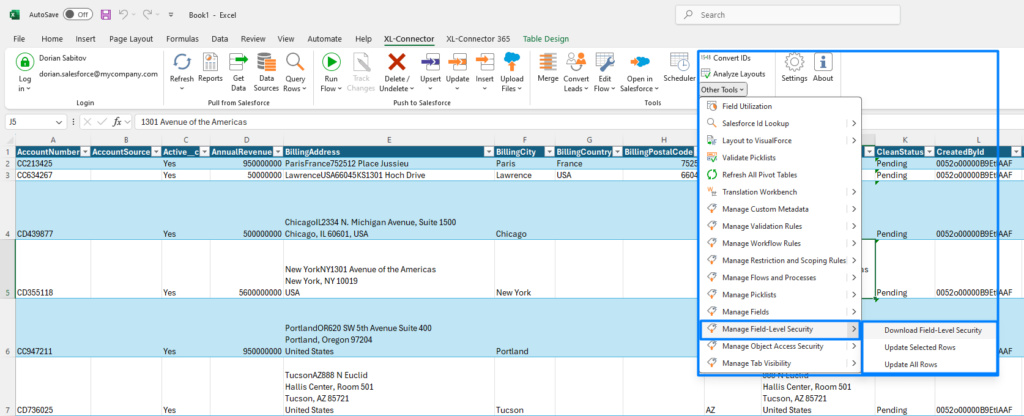
- Mass Managing Field-Level Security: Adjust field-level security settings for multiple profiles and fields at once. You can enable or disable field access, set read-only permissions, and apply these changes across various profiles without navigating through Salesforce’s setup menus.
5. Automating Data Loads with XL-Connector Flows
The Flows feature allows you to automate Salesforce data operations directly from Excel:
- Automate Data Loads: Set up flows to automate importing, updating, or deleting records. Once configured, you can run these flows with a single click or schedule them to run at specific intervals.
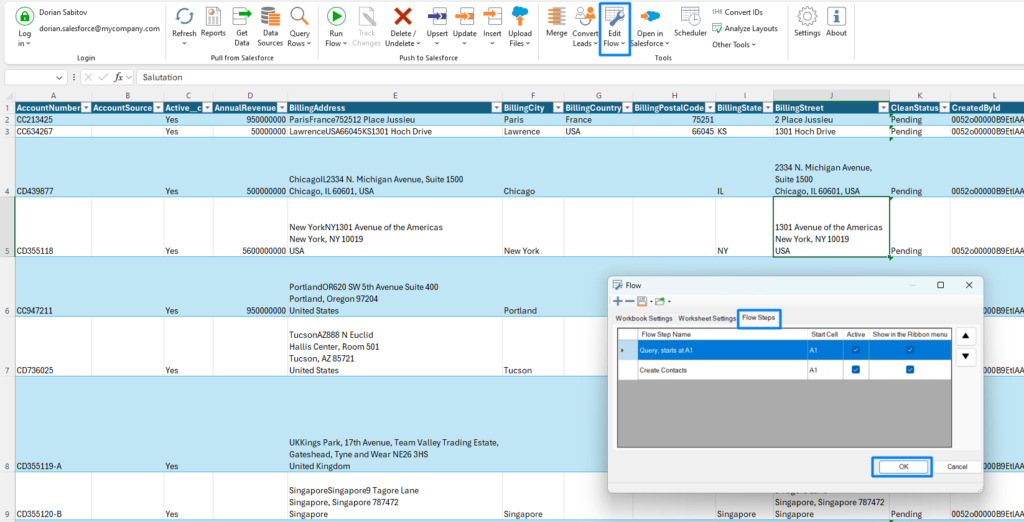
- Exporting and Importing Flows: Easily export flows and flow steps to share with colleagues or import them into other Salesforce orgs. This promotes consistency and efficiency across teams.
6. Converting Leads in Bulk
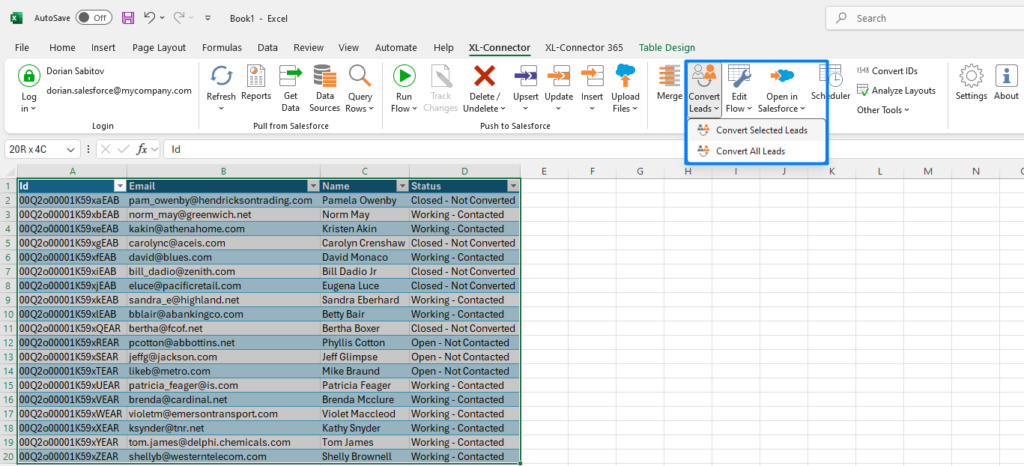
XL-Connector enables you to mass-convert leads into accounts, contacts, and opportunities directly from Excel. This feature streamlines the lead conversion process, allowing sales teams to update their pipelines quickly without manually converting each lead within Salesforce.
7. Loading Custom Metadata
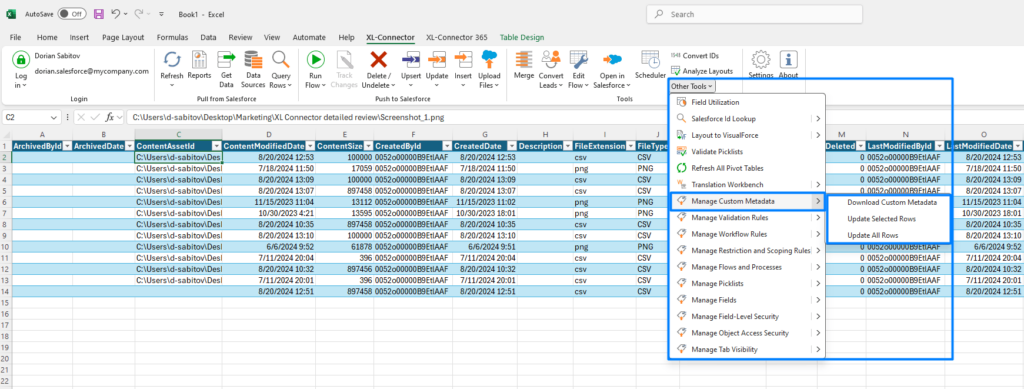
Admins can load and manage Custom Metadata Types using XL-Connector. This is useful for deploying configurations, settings, or custom functionalities across different environments. Managing custom metadata in Excel provides a clearer overview and simplifies the process of making bulk changes.
8. Using Custom Formulas to Dynamically Pull Data
Leverage custom Excel formulas to dynamically retrieve data from Salesforce. This feature allows you to build dynamic reports and dashboards that update automatically based on specific criteria or parameters defined in your formulas. It’s a powerful way to customize data retrieval without writing complex code.
9. Validating Dependent Picklists
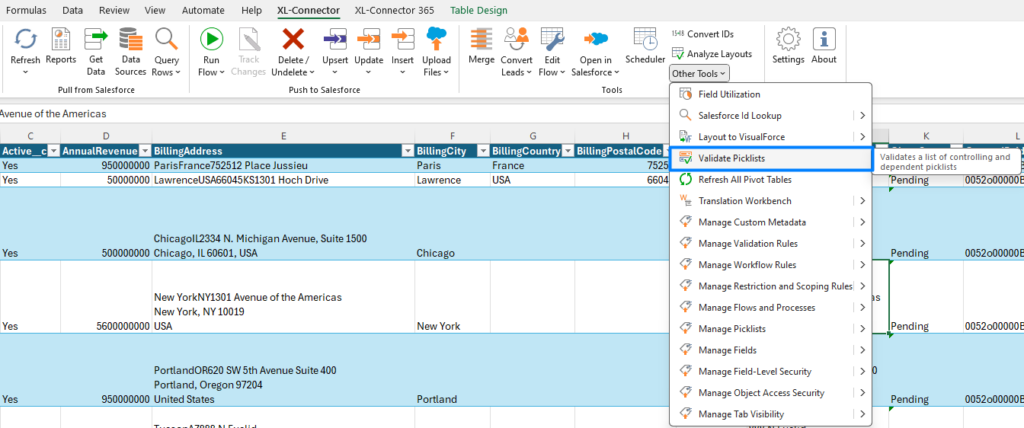
Ensure data integrity by validating dependent picklist values before uploading data to Salesforce. XL-Connector can check that the combinations of picklist values meet the defined dependencies, helping you avoid errors and maintain consistent data quality.
10. Uploading Files to Salesforce
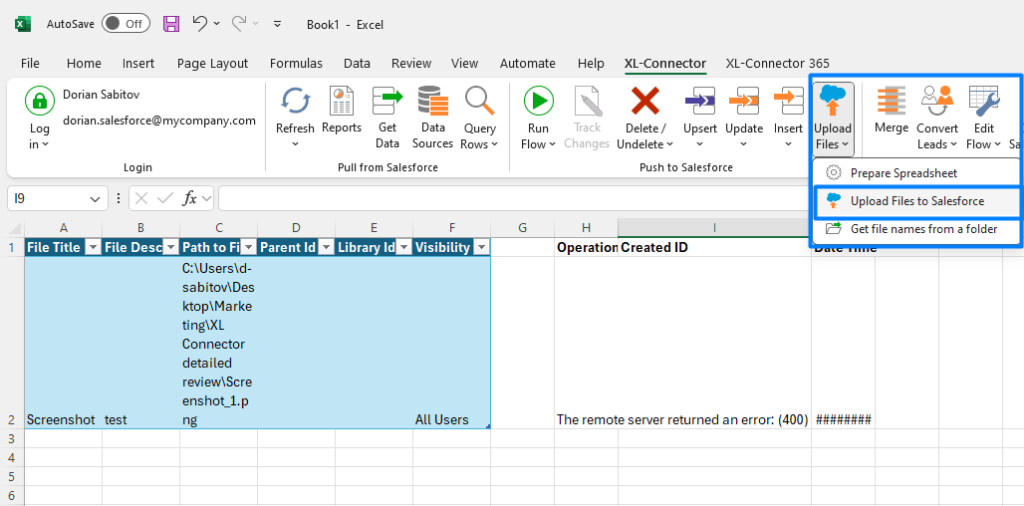
Bulk upload files and attachments to Salesforce records directly from Excel. Whether you’re associating contracts, images, or other documents with records, this feature streamlines the process by handling multiple files in a single operation.
11. VBA and Advanced Automation
For advanced users, XL-Connector supports the use of Visual Basic for Applications (VBA) scripts. You can automate complex tasks, create custom functions, and further extend the capabilities of XL-Connector to suit specific business needs.
12. Analyzing Field Utilization Across Layouts
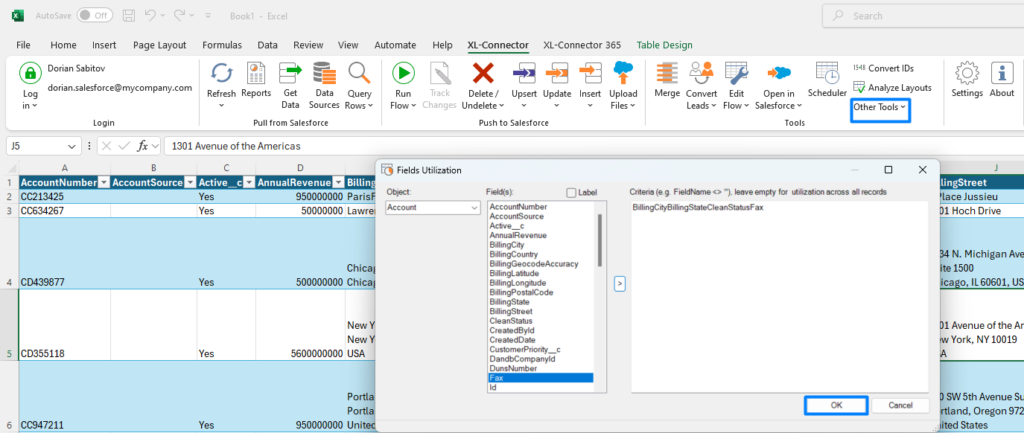
Gain insights into how fields are used across different page layouts:
- Identify unused or redundant fields.
- Optimize page layouts for better user experience.
- Ensure compliance with data governance policies.
By analyzing field utilization, you can streamline your Salesforce setup and improve overall system performance.
13. Generating Visualforce Pages from Page Layouts
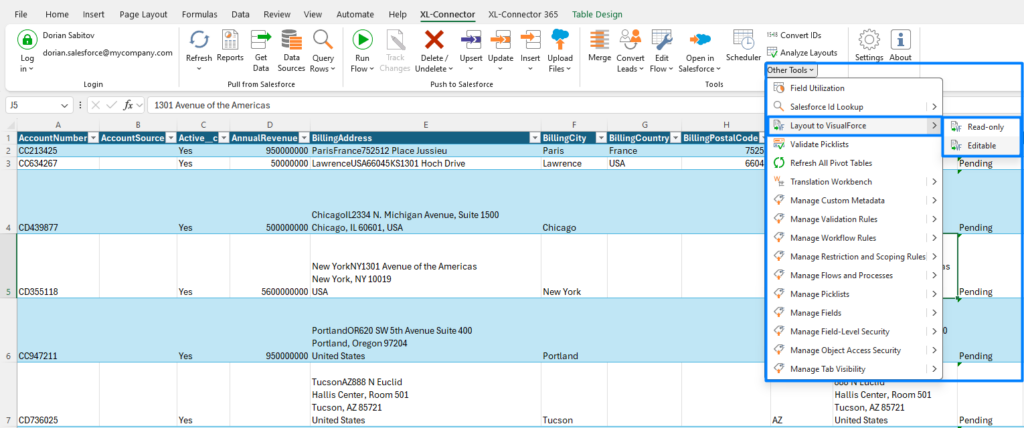
XL-Connector can assist in generating Visualforce pages based on your existing page layouts. This feature simplifies the development of custom interfaces within Salesforce, allowing developers to quickly create Visualforce pages that mirror the layout and functionality of standard pages.
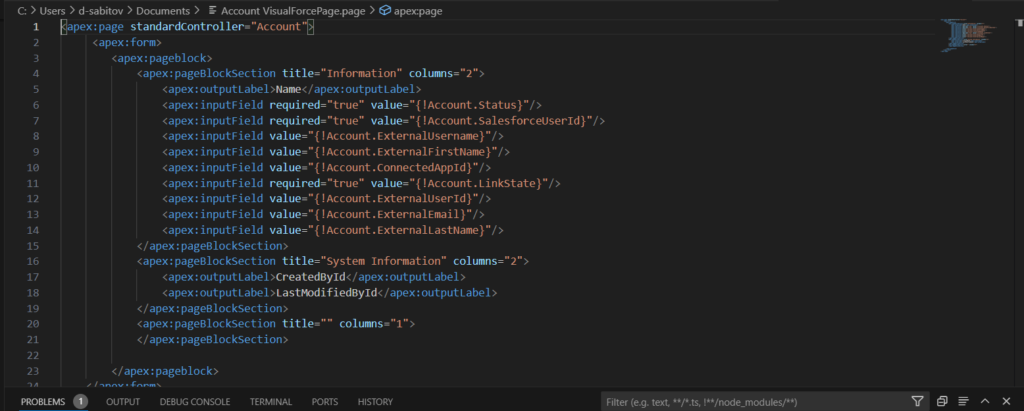
14. Removing Duplicate Records
Maintain a clean and accurate database by identifying and/or removing duplicate accounts, contacts, and leads. XL-Connector provides tools to compare records and consolidate duplicates, helping you improve data quality and reliability.
15. Bringing Picklist Values into Reports
Easily include picklist values in your Salesforce reports by pulling them into Excel. This allows for more comprehensive reporting and analysis, as you can view and manipulate picklist data alongside other record information.
These features empower Salesforce administrators and developers to manage and manipulate data more efficiently. By leveraging XL-Connector’s capabilities, you can:
- Save Time: Automate repetitive tasks and handle bulk operations with ease.
- Enhance Data Quality: Validate data before it enters Salesforce, reducing errors.
- Improve Productivity: Customize the tool to fit your team’s workflows and preferences.
- Streamline Development: Simplify complex tasks like metadata management and custom page generation.
XL-Connector bridges the gap between Excel and Salesforce, providing a powerful platform for advanced data management without the need for extensive coding or manual effort.
Use Cases and Business Benefits of XL-Connector
XL-Connector is more than just a tool for Salesforce data management; it’s a solution that streamlines workflows and significantly reduces time spent on routine tasks. Let’s look at some real-life examples of how businesses use XL-Connector and the benefits they experience.
1. Improving Efficiency in Bulk Data Updates
For companies handling large datasets, manually updating Salesforce records can be slow and prone to errors. Imagine a sales team at a retail company that managed thousands of leads and found XL-Connector invaluable for:
- Mass updates: They used XL-Connector to update thousands of lead records at once, instead of having to do it manually in Salesforce.
- Data accuracy: By applying Excel’s formulas, they ensured all changes were correct before pushing them back to Salesforce.
- Error reduction: The tool allowed them to validate data, reducing mistakes and speeding up the process.
Benefits: This company saved hours of work every week, allowing the sales team to focus on closing deals instead of spending time on data entry.
2. Automating Daily Reports and Data Syncs
For this case, we can take an e-commerce business needed to automate the process of pulling sales data from Salesforce and updating inventory levels. By using XL-Connector’s Flows:
- Daily automation: They set up scheduled flows to automatically pull sales data into Excel and update Salesforce with the latest inventory numbers each morning.
- Seamless data sync: This ensured that both their sales and inventory systems stayed updated without needing manual exports and imports.
Benefits: This automation cut down hours of manual effort and reduced the risk of outdated information, ensuring that customers always saw accurate product availability online.
3. Managing Field-Level Security Across Departments
A financial services company had strict security needs due to regulations, and managing access to Salesforce data across multiple departments was a challenge. They used XL-Connector to:
- Update security settings in bulk: Administrators could pull all field-level security settings into Excel, adjust permissions, and then push the changes to Salesforce in one step.
- Streamline security management: Rather than changing settings for each profile individually in Salesforce, admins could manage permissions for hundreds of fields at once.
Benefits: This simplified their security updates, ensuring compliance with financial regulations and cutting the time spent on managing user permissions.
4. Facilitating Smooth Data Migration
When an organization moved from an outdated CRM to Salesforce, they used XL-Connector to ensure that all their data was migrated correctly. The process involved:
- Importing bulk records: They used XL-Connector to transfer contacts, donors, and project data into Salesforce in bulk, maintaining relationships between records like donors and donations.
- Data validation: With custom Excel formulas, they were able to validate data and ensure it matched Salesforce’s format before uploading.
Benefits: The nonprofit was able to transition smoothly to Salesforce with minimal data errors, saving them both time and resources.
5. Simplifying Custom Metadata and Scoping Rules Management
A technology company using Salesforce needed a more efficient way to manage custom settings across different environments (production, sandbox). With XL-Connector, they:
- Updated custom metadata: They could easily export and update custom metadata types, such as system settings or configuration records.
- Controlled access: Scoping rules were configured in Excel to control which data different users could see, depending on their role.
Benefits: This allowed them to maintain consistency across their environments and ensure that employees only saw the data they needed, improving both data security and efficiency.
6. Bulk Lead Conversions for Sales Teams
A sales team in a growing startup used XL-Connector to streamline the lead conversion process:
- Mass lead conversion: Instead of converting leads one by one, the team could convert hundreds of leads into accounts, contacts, and opportunities at once directly from Excel.
Benefits: This move sped up their sales pipeline, allowing the team to focus on nurturing opportunities rather than administrative tasks.
7. Simplified File Uploads
Imagine a law firm needing a way to upload large volumes of case documents to Salesforce quickly. XL-Connector allowed them to:
- Bulk upload attachments: By using the file upload feature, they uploaded hundreds of legal documents to Salesforce records in one operation.
Benefits: This saved the legal team countless hours, letting them manage their cases more efficiently while ensuring all documents were properly attached to Salesforce records.
8. Automating Custom Reports with Excel Formulas
A business intelligence team used XL-Connector to automate their custom reports:
- Dynamic data retrieval: They built custom formulas in Excel to pull live data from Salesforce and apply various analyses, such as sales trends or forecast models.
- Real-time reporting: The reports were automatically updated every day, allowing the team to always work with the latest data.
Benefits: The team saved hours each week on manual report updates and had real-time insights into business performance, allowing for quicker decision-making.
From sales teams to savvy admins and nonprofit organizations, XL-Connector has proven itself as a reliable, powerful tool that simplifies Salesforce data management. It enables users to handle large datasets with ease, automates repetitive tasks, and provides flexible, real-time insights, all while using the familiar Excel interface. Whether it’s automating reports, improving data security, or managing bulk records, XL-Connector saves time, reduces errors, and increases overall productivity for businesses.
User Experience: Interface and Ease of Use
XL-Connector is designed with ease of use in mind, offering a familiar Excel-based interface that most users are already comfortable with. The tool adds a new ribbon to Excel, where all the essential Salesforce integration functions are clearly labeled. Users can easily pull data from Salesforce, update records, and push changes back to Salesforce with just a few clicks. There’s no need for extensive technical knowledge, and most users can get started with minimal training.
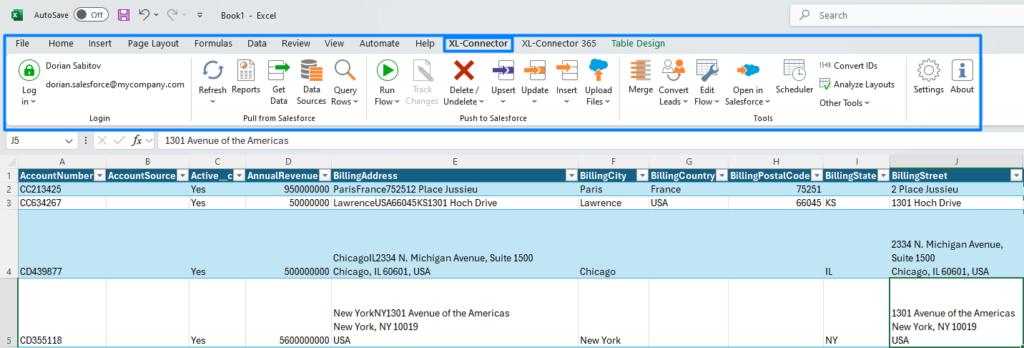
The biggest advantage of the XL-Connector is its Excel-first design, which means that users don’t have to switch between multiple tools or interfaces. This simplicity shortens the learning curve, even for people new to Salesforce administration.
User Feedback: What People Are Saying About XL-Connector
Users across various industries have provided positive feedback for the XL-Connector, highlighting its ease of use, powerful features, and time-saving capabilities.
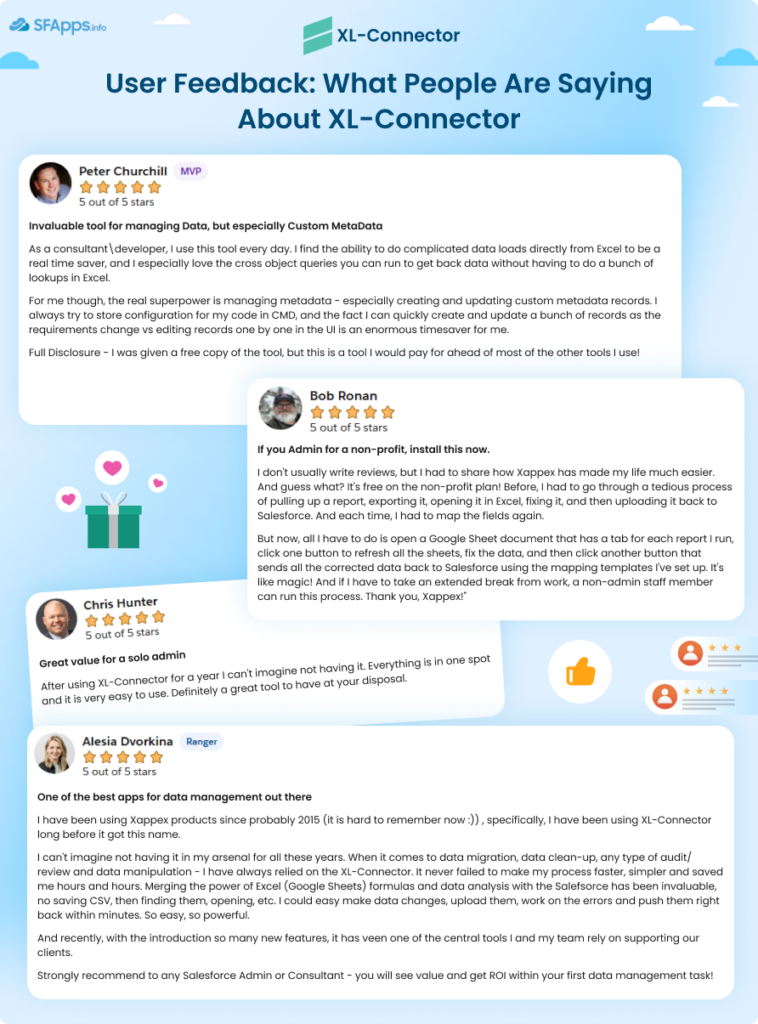
Peter Churchill (Consultant/Developer) ⭐⭐⭐⭐⭐
Peter finds the XL-Connector invaluable for managing complex data loads directly from Excel, especially for custom metadata management. The ability to update and create metadata records in bulk saves him considerable time. He particularly appreciates that he can avoid lookups in Excel when running cross-object queries and updates, making his workflow more efficient. Despite being given a free copy of the tool, Peter expresses that he would willingly pay for XL-Connector over other tools because of its immense value in his daily tasks.
Alesia Dvorkina (Salesforce Ranger) ⭐⭐⭐⭐⭐
Alesia has been using XL-Connector since around 2015, and it’s one of the most essential tools in her arsenal for data migration, clean-up, and manipulation. She highlights the ability to merge Salesforce data with Excel, enabling quicker data changes and updates. Alesia finds that XL-Connector has helped her save hours of work, especially with data audits and reviews. She strongly recommends the tool to any Salesforce admin or consultant, citing a strong return on investment with its time-saving features.
Chris Hunter (Solo Admin) ⭐⭐⭐⭐⭐
Chris praises XL-Connector for being incredibly valuable, particularly for solo admins like himself. He mentions that the tool has simplified his data management tasks by keeping everything in one spot, making it easy to use. After a year of using it, Chris finds it hard to imagine working without it, describing XL-Connector as a “must-have” tool for Salesforce admins.
Bob Ronan (Nonprofit Admin) ⭐⭐⭐⭐⭐
Bob, working at a nonprofit, emphasizes how XL-Connector has made his life easier by automating data processes that used to be time-consuming. For nonprofits, the tool is free, which is a huge bonus. Bob explains how he used to manually export, fix, and re-upload data, but now, with XL-Connector, he can run all of these operations with just a couple of clicks. He describes the tool as “magic” for any admin who needs to streamline data management processes.
Aiden Martin (Salesforce MVP) ⭐⭐⭐⭐⭐
Aiden, with over 20 years of experience using Salesforce, calls XL-Connector his favorite tool for managing a Salesforce org. He emphasizes that it’s much more than just a data loader, as it’s the ultimate tool for handling multiple aspects of Salesforce management. Aiden praises the constant addition of new features and the excellent support from the XL-Connector team, encouraging others to give it a try.
This feedback highlights the tool’s efficiency, versatility, and widespread appeal, particularly in the areas of bulk data updates, automation, and metadata management. Users consistently note the ease of integrating Salesforce with Excel and how XL-Connector improves their workflow, saving hours on routine tasks.
Pricing and Licensing Options
Free Version and Trial Period
XL-Connector offers a free version with limited functionality, which is useful for individuals or small teams just getting started. This version allows you to perform basic operations such as data imports and exports. However, for more advanced features like mass data updates, automated workflows, or metadata management, a paid version is required.
The tool comes with a 15-day free trial for new users, allowing them to test out all features before committing to a paid plan. Additionally, nonprofits receive special discounts, with the first license being free and subsequent licenses offered at a reduced price.
Paid Features and Pricing
- Team Player License: This is suitable for small teams or individuals needing regular data syncs and some automation features. Prices typically start at $99 per user per year.
- Enterprise Admin License: For larger organizations or teams that need bulk operations, metadata management, and more complex workflows, the enterprise plan offers advanced functionality at around $299 per user per year. Discounts are available for teams that purchase multiple licenses.
Insight:
All paid plans give you access to both XL-Connector and XL-Connector 365, covering you for both the desktop and online versions of Excel.
Wrapping Up
XL-Connector, formerly known as Enabler4Excel, has evolved into one of the most effective tools for managing Salesforce data through Excel. As an Excel to Salesforce connector, XL-Connector allows users to seamlessly sync data between the two platforms, saving time and minimizing errors. With Xappex XL-Connector, you can pull data from Salesforce, make updates in Excel, and push those changes back without dealing with the complexities of CSV imports or manual updates.
This Salesforce to Excel connector is designed for users who want the power of Excel’s functionalities, like formulas, pivot tables, and bulk editing, while maintaining a direct connection with Salesforce. The XL-Connector Salesforce tool helps admins and consultants handle tasks like bulk data updates, lead conversions, metadata management, and more, all within the familiar Excel environment.
One of the key benefits of the XL-Connector is the versatility of its features, making it an all-in-one solution for data and metadata management, that replaces the combined use of many different and expensive tools. It simplifies the process of managing complex data operations, making it an ideal choice for both new and experienced Salesforce users.
Whether you need an Excel connector to Salesforce for mass data uploads or a way to automate reporting and workflows, XL-Connector offers a flexible, user-friendly solution. It’s more than just an integration tool, as it’s a complete platform for managing Salesforce data efficiently from within Excel, making it an essential tool for businesses looking to improve their data operations.
In summary, Xappex XL-Connector is a top choice for anyone looking for a Salesforce XL-Connector that provides powerful features while being simple to use. If you’re looking to enhance your Salesforce data management, this tool is a must-have.

Dorian is a 6X Certified Salesforce Developer and Administrator with a start in the IT world as a CRM Admin in 2020. Since diving into Salesforce in 2021 via Trailhead and Focus on Force, he has achieved a Ranger Rank, earned several Superbadges, and bagged certifications including the Salesforce Certified Platform Administrator, Platform App Builder, Platform Foundations and Platform Developer by 2023. In 2024 he also became Salesforce Certified AI Associate and earned Agentforce Specialist Certification in 2025. Dorian is very keen on continuous learning, always looks for fresh ways to improve his knowledge. He enjoys running, boxing, kickboxing and reading diverse kinds of books in his free time.

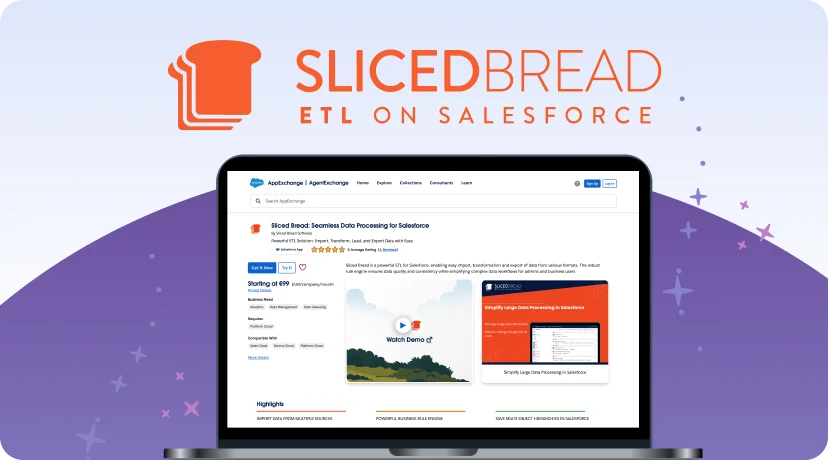
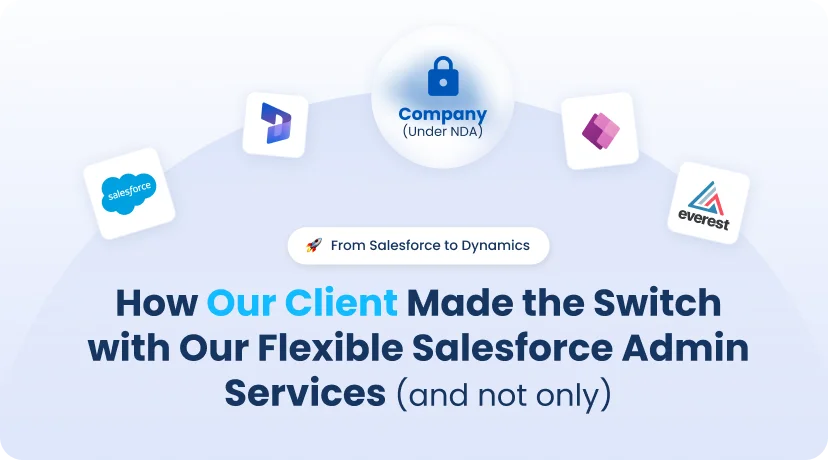


 Previous Post
Previous Post Next Post
Next Post